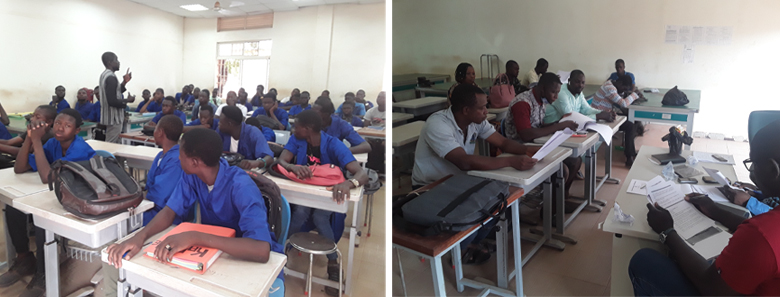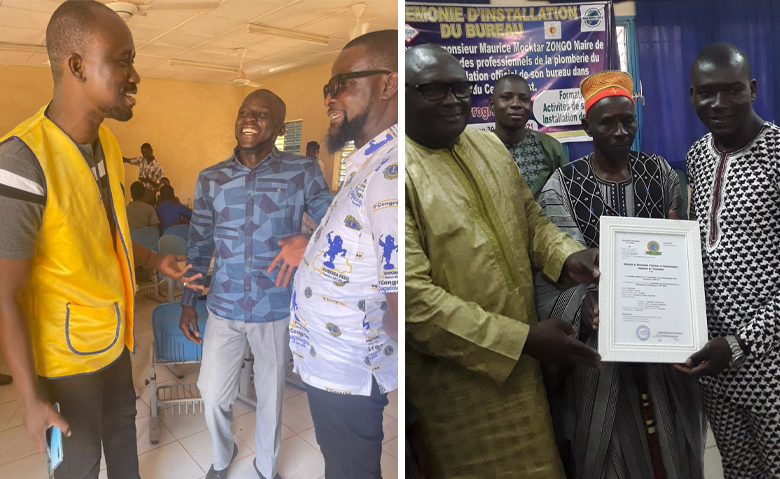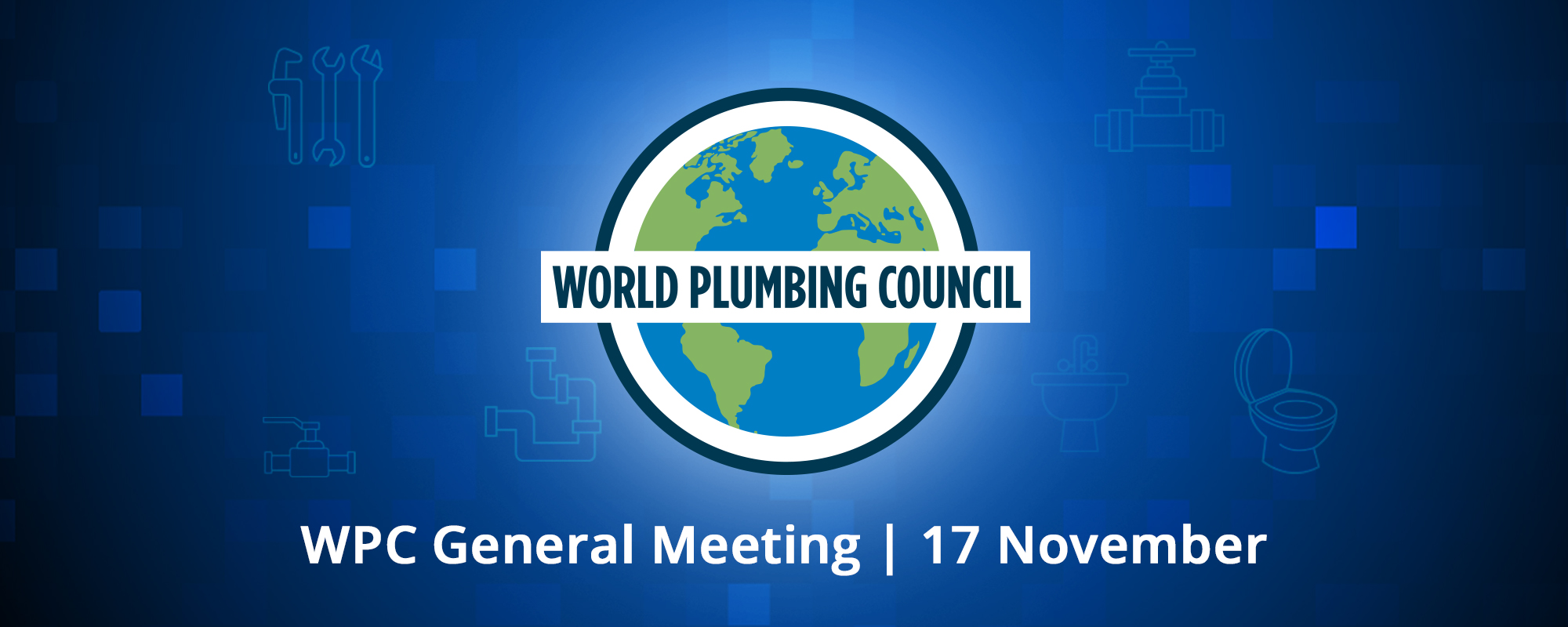
|
|
The World Plumbing Council will hold its annual General Meeting on 17 November from 6 to 8 p.m. Eastern Standard Time (U.S. and Canada). The meeting will be held virtually and is free to all who wish to attend. In addition to the regular WPC business, there will be a presentation from Rwanda Plumbers Association (RPO) President Jean Claude Twagirimana on the work the RPO has accomplished in collaboration with the IWSH Foundation. Following this presentation, there will be a panel discussion, "Hydrogen – Our Future." Panelists will include David Norman, chief executive officer at Future Fuels CRC, Melbourne, Victoria, Australia; Alexander Ziehe, director of Business Development Asia Pacific/head of Sales Oceania at Viessmann; and Mary Usovicz, UMass Lowell, USA. Paul Bonsak of IAPMO R&T Oceana will moderate the discussion. For more information and to register, visit: www.worldplumbing.org/2021-general-meeting/ We hope you'll join us!
|
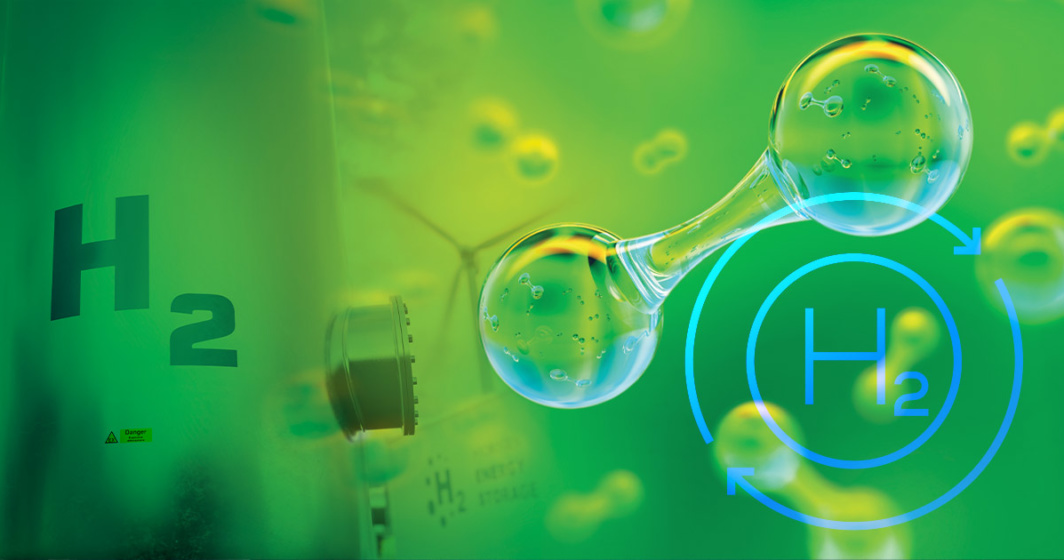 |
|
Submitted by Master Plumbers, plumber.com.au Master Plumbers believes embracing green hydrogen will go a long way to meeting our goal of net-zero emissions by 2050 The plumbing and gasfitting industry have an exciting opportunity to lead the charge toward a nationwide push toward green hydrogen, in line with the commitment several Australian states and territories have made to produce net-zero emissions by 2050. That's the conclusion of a new discussion paper prepared for Master Plumbers that outlines the significant opportunities and challenges presented to the industry by the shift toward hydrogen. Australia's Chief Scientist Dr. Alan Finkel describes hydrogen as "a zero-emissions fuel that exists on Earth in abundance, can easily be extracted using basic chemistry and offers jobs and investment in Australia for decades to come." Traditionally, hydrogen has been produced by coal and gas. This "grey" hydrogen, as it has become known, emits carbon dioxide. According to the International Energy Agency, around 830 million tons of carbon dioxide are pumped into the environment each year due to the production of hydrogen. As governments around the world grapple with options to achieve net-zero emissions and create more sustainable futures for generations to come, "green" hydrogen has the potential to be a key enabler. As the name suggests, green hydrogen is the cleanest type of hydrogen, generated by renewable energy sources without emitting any carbon in the first place. The process of creation involves electrolysis, which extracts hydrogen from water. When the electrolyzer (the device that splits water into hydrogen and oxygen using electrical energy) is powered by renewable energy, the whole process is emission free. Gary Bath, chief technical officer with Master Plumbers, says green hydrogen can play a key role moving forward. "The future for the gas industry currently rests with the possibilities surrounding bio-gas and hydrogen. Hydrogen, if produced economically and renewably, could provide a safe and effective gas for the future, either through injecting into existing natural gas infrastructure or as a stand-alone fuel gas," he said. This will involve a big shift for southern states of Australia, which have traditionally relied on natural gas for heating. "State rebate schemes are driving some of this change encouraging consumers to move, from so-called 'inefficient gas hot water systems and heating appliances' to heat pumps and refrigerated air-conditioning units. While the increased efficiency of both types of appliances has improved are we ready for the potential increased load on our electrical grid?" New South Wales, Queensland, Victoria and South Australia have developed hydrogen strategies, and a National Hydrogen Strategy released by the federal government outlines two key phases – the present day until 2025, which will allow for the piloting, trialing and demonstration projects as well as large-scale market activation from 2025 onward. As Master Plumbers' discussion paper outlines, hydrogen could be a long-term alternative to natural gas in the Australian domestic market. Finkel has concluded that hydrogen is no longer just a good idea, but a realistic and sustainable energy solution that can meet domestic and commercial energy needs, with the potential to lower power production and carbon emissions while delivering wider economic benefits. Hydrogen can be safely added to natural gas supplies at 10% by volume without changes to pipelines, appliances or regulations. Over time, and with modifications to the existing gas networks and appliances, hydrogen has the potential to completely replace natural gas for domestic cooking, heating and hot water. So, what does this mean for the plumbing industry? With about 20,000 licensed gasfitters and 28,000 licensed plumbers in Victoria, there is enormous potential for the plumbing industry to help lead the transition to hydrogen in line with state and territory targets. The skills required for water electrolysis and fuel cells will not be too different from current practices, but it is possible that more gasfitters will be required to undertake a restricted electrical license (REL) training. The discussion paper highlights that the existing skill sets of plumbers and gasfitters ensures they are well equipped to deal with hydrogen. "The plumbing and gasfitting industries can be at the forefront of the push across Australian states and territories towards net-zero emissions, of which hydrogen energy sources will play an enormous role," Master Plumbers CEO Peter Daly said. A shift to hydrogen may require some infrastructure upgrades. For example, in Victoria, existing infrastructure is expected to accommodate blends of gas with 10% hydrogen but upgrades and retrofitting pipes may be required if we move to high blends or pure hydrogen. This is because, at some temperatures and pressures, high concentrations of hydrogen gas can degrade the quality of metal and older plastic pipes and potentially make them more brittle. Hydrogen is also a much smaller molecule, which makes some pipes and connections more prone to leakage. This can be addressed with retrofitting of parts of the existing network and through lining of pipes as we have done in the past in potable water and sewer networks. Daly said that Master Plumbers has been anticipating the current shift toward hydrogen for some time. "That's why our state-of-the-art PICAC training facilities in Brunswick and Narre Warren are being equipped with world-class hydrogen training equipment, including separate zones where training can structure towards hydrogen gas," he said. "In Queensland, a purpose-built and world-class Hydrogen Centre of Excellence is being established to train or retrain practitioners to use blended or pure hydrogen safely. "We believe that if Australia is to truly embrace and take advantage of the possibilities and opportunities provided by hydrogen, more training facilities may be needed in the future. As Daly points out, hydrogen is not risk-free. It has a broader flammability range than natural gas and can react with certain metals, which might result in changes to fittings and appliances. "These risks can be controlled and managed, evidencing the critical nature of training to protect and support not only workers but also the general community," he said. "Our industry needs to play an important role in helping not only consumers but political leaders to understand these risks and respond to them appropriately." Questions to consider
Email your thoughts to membership@plumber.com.au
|
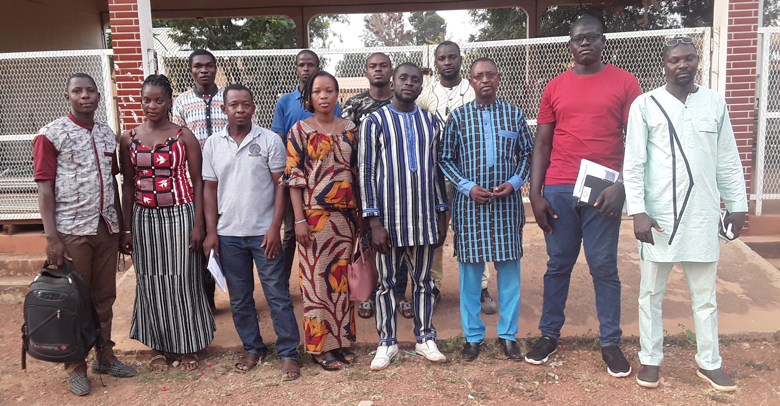 |
|
Above: The executive board members after our General meeting. From left to right we have: the vice-president, the second secretary, the first secretary, the first treasurer, the president, our honorary member ( first plumbing teacher of Burkina Faso), secretary of organizations and external relationship (he is from one of the old plumbing campanies of Burkina Faso), the second secretary of organizations and external relationship. The back from left to right second treasurer, secretary of gentlemen mobilisation, second secretary of information, the first secretary of information. Submitted by Abdoul Sawadogo The Professional Plumbers Association of Burkina Faso has begun preparations for celebrating World Plumbing Day 2022. The association began by meeting plumbers at the training school and holding a general meeting to discuss how they will celebrate. WPD 2022 will be celebrated at the center West region of Burkina Faso called Koudougou. In preparation, activities were organized for 28 – 30 October, including sanitation activities, training and sanitization activities, and the installation of the regional executive board at the center West region. Below are some pictures from the event.
PAZA WATER SANITATION AND HYGIENE TEAM ASSESSES WATER CHALLENGES IN KAOMA DISTRICT – WESTERN PROVINCE OF ZAMBIA
|
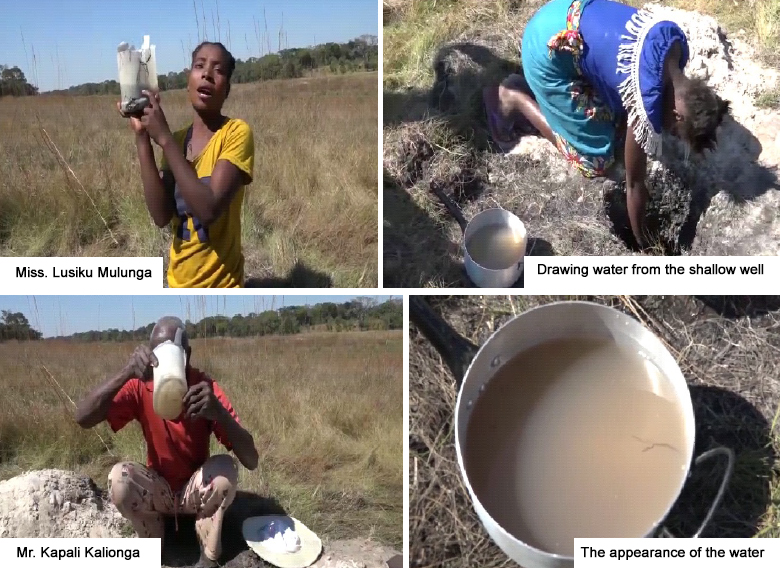 |
|
The Plumbers Association of Zambia (PAZA) Water Supply and Sanitation team took action in surveying water challenges in the Kaoma district of Western Province, responding to news from community television (Diamond TV) that some people from remote areas in Kazavami villages were drinking contaminated water from shallow wells not safe for human consumption. The PAZA Water Supply and Sanitation team followed the case and sent experts to investigate the issue. It was discovered that indeed people of Kazavami village share water with domestic animals. One of the residents of the Kazabami community, Mr.Kapali Kalionga, complained that their drinking water is full of dead frogs and other solid particles that are not safe for human consumption, and have been for many years now. He said that they are not only using the water for domestic purposes, but also for drinking. Mr. Kalihonga complained further that the government is not taking care of them, and he requested and appealed to the PAZA team to help their community by supplying safe drinking water in the area to avoid diarrheal diseases. Another resident, Miss Lisuku Mulunga, described the situation in their village as dangerous to their health and the water not safe for human consumption, saying urgent measurees are required because the water they are drinking looks very bad and has a bad color. The residents appealed to PAZA to provide piped water in the area. In response, PAZA Project Coordinator Mr. Mulonda Kawana assured people in the community that it is the association's responsibility to ensure that people from different communities with water challenges receive safe water and good sanitation; he added that PAZA is working hard to develop a plan to help the people in this critical situation.
TWO DEAF PLUMBING AND PIPEFITTING STUDENTS RECEIVE SKILLS SUPPORT FROM PAZA |
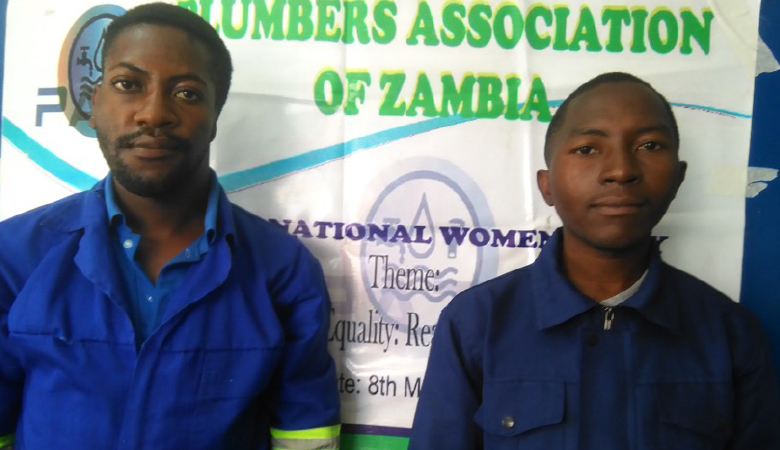 |
|
The Plumbers Association of Zambia (PAZA) was approached by two deaf plumbing and pipefitting students, Pepulani Nyirongo, 25, and Bwalya Chewe, 24. Nyirongo, via sign language, said he plans to start a plumbing business and to be self-employed. He said the only challenge for him is transport, which is very hard for him when going to school. He would like to learn more about plumbing appliance installation. He further mentioned that school fees are very high for him. Nyirongo said any support from any non-governmental organizations like PAZA would be appreciated. Chewe also said that after finishing his studies he would like to be self-employed and establish his own business. He said he plans to continue studying to a high level in plumbing. In his response, Chewe said he is on bursary, but the serious challenge is transportation from home to school because he has no parents to sponsor him in other things. Sometimes he is helped by his friend Nyirongo and Innocent (the interpreter). Chewe said he has completed the secondary school level but he doesn't have much support from relatives to attain his vision to succeed in the future. PAZA President/CEO Mr. Moses Chongo assured them that the association is ready to support and work with them, and to engage them in various programs at the local and national levels. Chongo promised to award them with free membership and to encourage them to work hard so that they learn about plumbing and are successful.
PAZA AND IWSH RENEW MOU FOR 2021-2023 On 1 October, PAZA and the IWSH Foundation, both not-for-profit organizations, agreed to renew their MOU partnership that spanned from August 2020 to August 2021. Both parties desire to continue cooperation to provide water, sanitation and hygiene (WaSH) services to underserved communities in Zambia. The two organizations also desire for their MoU to be in effect for a period of two years and agreed to continue renewing collaboration opportunities. PAZA and IWSH will collaborate to achieve the following outcomes: PAZA and IWSH will undertake responsibilities such as:
In addition, IWSH will promote PAZA on an international stage, and help with fundraising and sponsoring projects. Both organizations acknowledged the limitations and disruptions caused by the global COVID-19 pandemic and agreed to collaborate to move forward the objectives of the new MoU in spite of limitations arising from it. PLUMBERS ASSOCIATION OF ZAMBIA EVENTS FOR 2022 1. Skills competitions and Plumbing Challenge (Innovations): February 2022
|
 |
|
Submitted by Master Plumbers, plumber.com.au Information is critical in the fight against COVID-19, and wastewater is one of the key sources used to identify the presence of the virus in our communities. A critical component in the fight against COVID-19 is establishing where transmission of the virus occurs. Since the start of the pandemic in early 2020, the public naming of exposure sites by health authorities, and the requirement for people who were at the same sites during the same time to monitor for symptoms or get tested themselves, has been an ongoing part of the public health response. Wastewater testing has been another crucial way governments and health departments can identify where COVID-19 may be present in the community to help to stop the spread. That's why used water from toilets, sinks, bathrooms and dishwashers is being analyzed and tested for fragments of SARS-CoV-2, the virus that causes COVID-19. Fragments of the virus can enter the wastewater system through people who have, or recently had, COVID-19. People shed the virus through used tissues, off their hands and skin or in stools, and this shedding can continue for weeks after a person is infectious. "The COVID-19 virus, SARS-Cov-2, can enter wastewater infrastructure through any of those means; however, it is likely to enter wastewater principally from fecal and respiratory shedding. Shed virus is then detected by analyzing the wastewater using analytical methods that are specific for SARS-CoV-2," said Dr. Nick Crosbie, Recycled Water and IWM research manager at Melbourne Water. "Wastewater monitoring is equivalent to obtaining and analyzing a large community-based composite sample of feces, saliva, vomit, sputum, urine, shed skin and other material shed during personal cleansing, washing, bathing, and excreting." Crosbie describes the Department of Health's surveillance as dynamic, "meaning that it is adjusted to meet changing needs; for example, to facilitate surge testing during outbreaks. "Samples are obtained by Australian Laboratory Services by 'grab sampling', auto-sampling, and by the deployment of so-called 'passive samplers', which accumulate the SARS-CoV-2 virus in the period of their deployment. In total, between a few hundred to more than 1,000 samples are collected and processed in a seven-day period. "The samples are analyzed by Australian Laboratory Services, with Monash University undertaking analysis of the passive samplers. Presumptive detections are confirmed by analysis performed at the Walter and Eliza Hall Institute of Medical Research." While wastewater testing has been of public prominence during the pandemic, it is regularly undertaken around the world to monitor poliovirus, norovirus and adenovirus. Crosbie has been personally involved in the work for about five years. "Melbourne Water has been involved in providing wastewater samples for the national polio surveillance program since 2014, and we have also provided wastewater samples for Norovirus surveillance, drug surveillance, and for the Global Sewage Surveillance Project initiated in 2016," he said. Crosbie said the public identification of locations in which viral fragments are identified in wastewater – announced by the Department of Health on a regular basis, including the sending of text messages to people in affected postcodes – allows health authorities to target their responses. "Information can be used by health departments to further focus their investigations, and to encourage an increase in local clinical testing rates. In Melbourne's recent outbreak (May/ June 2021), wastewater surveillance has facilitated the identification of four new cases," he said. The role the plumbing industry plays in effective wastewater testing is clear. The provision of safe and effective plumbing and sanitation shows how the plumbing industry contributes to strong public health, Master Plumbers CEO Peter Daly said. "Plumbers play a vital role in developing, maintaining and promoting public health among the community. Plumbers prevent against disease and illness stemming from poor plumbing and sanitation, and against the dangers of unsafe gas appliances, some of which can be deadly," he said. In 2018, Master Plumbers published the report "A stronger plumbing industry safeguarding our community: Plumbing industry priorities," which highlighted the valuable role plumbers play in public health and safety. This includes the prevention of Legionnaires' Disease caused by cooling towers and the increasing use of warm water systems in buildings, as well as the servicing and maintenance of gas appliances to eliminate the risk of carbon monoxide (CO) poisoning. "Master Plumbers continues to advocate for strong public health and safety awareness program on the risks posed by asbestos, legionella, lead and carbon monoxide," Daly said. "Our day-to-day work in plumbing and sanitation also supports the overall wastewater testing process to play a big role in the COVID-19 response,"he added. Dr Crosbie agreed. "Victoria's COVID-19 wastewater surveillance program is a huge team effort between people working in the plumbing industry, water industry, and the laboratory and health sectors," he said. "More generally, the safe operation of our water and wastewater infrastructure ensures that the community do not suffer from significant health effects from water and wastewater-borne diseases."
BPEC CONTRIBUTES TO WATER PROJECT FOR MALAWI MATERNITY CLINIC Submitted by BPEC Charity The BPEC Charity has helped fund DATUM Foundation's installation of a new clean water supply to the Chikwina village maternity clinic in northern Malawi. The impact is huge. The clinic now has access to fresh water from a fully functioning tap, enabling staff to clean equipment, wash laundry, prevent infection, and give new mothers and babies the benefit of clean water for drinking and washing. Prior to this, when water wasn't readily available, it had to be drawn from a borehole a 15-minute walk away. "BPEC is delighted to have been able to invest in such a worthwhile cause, which is already having a major impact on the Chikwina community," said Neil Collishaw, CEO at BPEC. "This is exactly the type of charitable initiative that sets BPEC apart from other organizations." Work on the water system started in June 2021 and included:
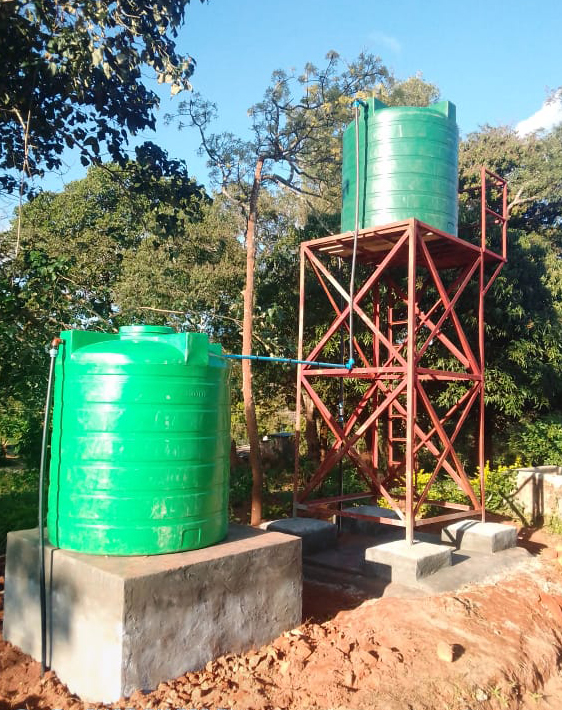
Now that the water system has been installed, the clinic provides a well-equipped and safe environment for mothers and their babies – playing an important role in helping to reduce mother and infant mortality in the region. "We know that access to clean water can literally save lives and made providing water and sanitation to the Chikwina clinic a priority," said Dean Buchanan, trustee at DATUM. "We were delighted to receive a life award grant of £1500 from the BPEC Charity towards the cost and can't thank them enough." Globally, 2.2 billion people lack access to clean drinking water. The result is that approximately 297,000 children under 5 die every year from diarrheal diseases due to poor sanitation and unsafe drinking water. In 2019 DATUM, an international development charity working with communities across Africa and Asia, refurbished the existing Chikwina maternity clinic that had been left derelict for five years. This included the construction of a brand-new waiting house for expectant mothers to stay in for two weeks prior to their expected delivery date, as many have to give birth at home or walk several miles to the clinic – but COVID-19 disrupted completion of the venture, including the water supply. Background BPEC is an industry-leading specialized provider of qualifications, assessments, training courses and learning materials. It is a unique organization led by employers for the benefit of the plumbing and heating industry, and all surplus funds generated by its activities are re-invested by The BPEC Charity. The BPEC life award is available to support projects that use plumbing knowledge and skills to improve the lives of others in the UK and abroad, and where possible transfer the skills and knowledge to others in the process. More information on BPEC at www.bpec.org.uk
|
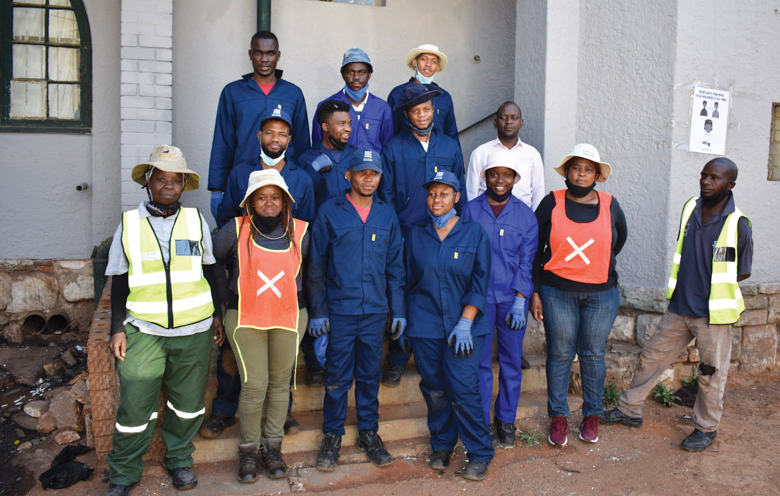 |
Above: The group of learners from BluLever Education replaced and repaired toilets, basins, showers, and urinals. These students were selected for a two-month work readiness course. Each team of students was overseen by a qualified plumber who would guide them through the process. Image credit: ©Plumbing Africa | Rory Macnamara By Rory Macnamara With ever-growing urban populations and the amount of infrastructure maintenance needed on dilapidated housing and buildings throughout South Africa's major cities, we need artisans who can maintain and service existing infrastructure. This "win-win" collaboration could be the beginnings of a solution to this mounting problem. Thirty-eight students gained work exposure while doing crucial plumbing maintenance to uplift parts of their communities. Plumbing Africa visited such a house in Doornfontein recently where learner plumbers were working hard to improve the water and waste systems as best they could under trying and difficult conditions. The condition of the house was appalling, but fixing the plumbing was a start to ensuring healthy access to water and correct disposal of waste. 
Under the watchful eye of the Water, Amenities, Sanitation, Services upgrading program (WASSUP) group, a Sticky Situations project operating in Diepsloot and Rabie Ridge two of our informal settlement areas, a group of learners from BluLever Education were replacing and repairing toilets, basins, showers, and urinals. These students were selected for a two-month work readiness course, called Leadership Base Camp, which is the final selection stage for the BluLever plumbing apprenticeship. The final week of the Base Camp gives students an opportunity to gain exposure to plumbing work for the first time to help then set their expectations about what plumbing work is about. Each team of students was overseen by a qualified plumber who would guide them through the process. Students had their guidance. Projects like this really help develop their capacities as an organization too. "IWSH, like IAPMO, is a World Plumbing Council member. We are keen to develop our partnerships with other WPC members, particularly in different parts of Africa where community plumbing efforts such as what we've seen in Johannesburg this week can have such an important effect on the day-to-day lives and wellbeing of so many people. For this reason, IOPSA is a key partner for IWSH in terms of African project collaborations, and so we hope that the shared experiences of this latest initiative are another positive step in terms of the IWSH-IOPSA relationship and potential for our organizations to do further work together in the future," concludes Kearney.
WHO WESTERN PACIFIC INNOVATION CHALLENGE The World Health Organization in the Western Pacific has launched the first WHO Western Pacific Innovation Challenge: Innovation for the Future of Public Health. The Innovation Challenge is calling for innovators to submit their solutions to better the health and well-being of people in the Western Pacific Region. Applications can be submitted at wproinnov.awardsplatform.com/. Read below for more information. The demand for health innovations in the Western Pacific is high and will continue to increase with emerging socioeconomic dynamics. In 2019, as part the For the Future vision in the Western Pacific, the Organization identified four strategic priorities to tackle over the coming five years: health security, including antimicrobial resistance; noncommunicable diseases and ageing; climate change and the environment; and reaching the unreached. In achieving this vision, For the Future calls on WHO tofind new approaches through innovation to meet these challenges and future ones. WHO in the Western Pacific has made efforts to embed innovation in the organizational culture, and is working to empower countries to chart a sustainable path to improving the health of people across the Region. The Innovation Challenge is an opportunity for WHO to source and select innovators with profound understandings of the health needs of people in the Western Pacific and to create an ecosystem of innovators who have sustainable, cost-effective, and inclusive solutions that can address these needs. WHO believes in the potential for both entrepreneurial forms of innovation, with new technologies, services and products that can advance the efficiency and effectiveness of public health, as well as more home-grown innovative solutions which may have explosive impact because they are already adapted to the local context potentially costing less to implement and scale. Find out more: www.who.int/westernpacific/news-room/events/detail/2021/09/24/western-pacific-events/innovationchallenge |
DATES FOR DIARY Kitchen & Bath Industry Show (KBIS) Kitchen and Bathroom Indonesia DesignBUILD Emerging Water Technology Symposium (EWTS) WPC’s Conference 2022 Contact secretariat@worldplumbing.org to provide an event report or request listing of an upcoming event. |
|
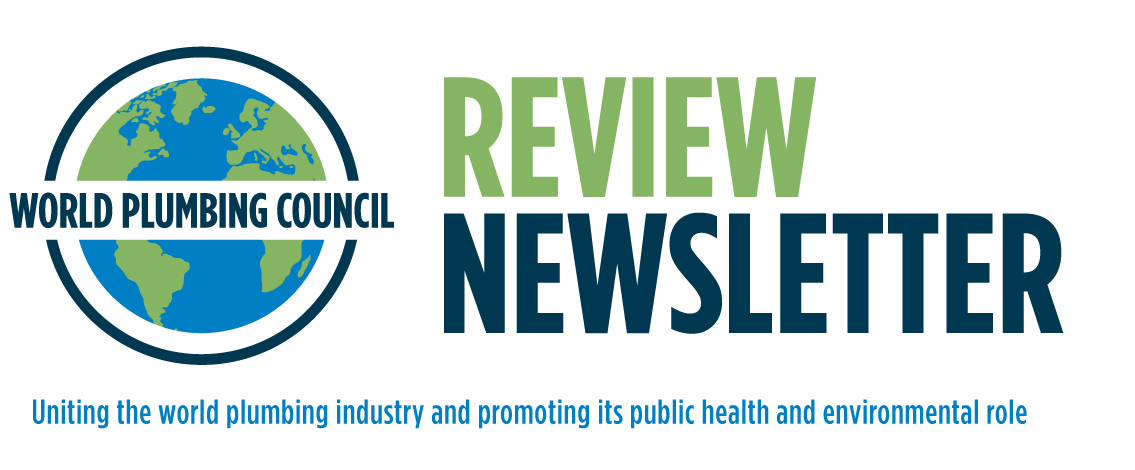
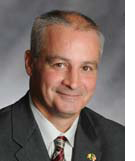 Greetings to all WPC members.
Greetings to all WPC members.